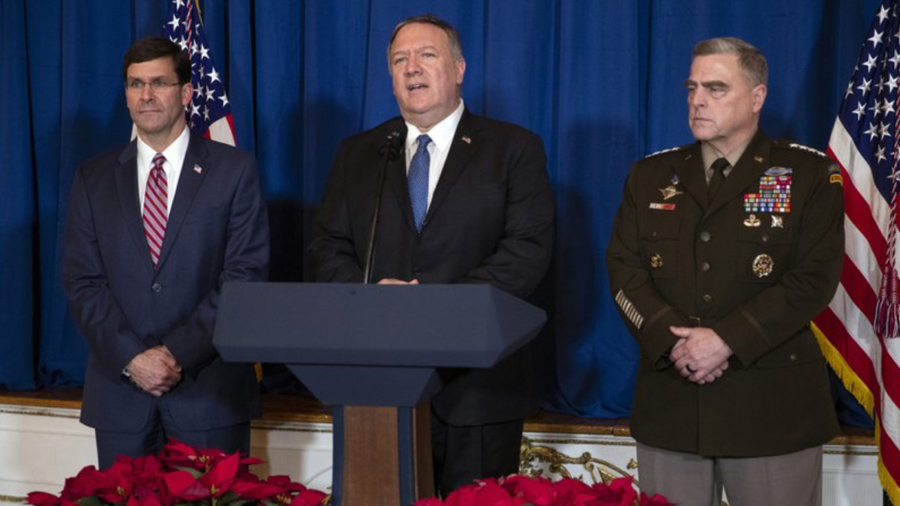Secretary of State Mike Pompeo spoke on the phone with the state heads of Saudi Arabia, Israel, and the United Arab Emirates (UAE) on Dec. 30, a day after the United States conducted defensive strikes, including on the headquarters of the Iran-backed Hezbollah Brigades terrorist group.
The Sunday strikes on Kata’ib Hezbollah targets in Iraq and Syria were conducted two days after a civilian U.S. defense contractor was killed in a rocket attack on a northern Iraqi military base. Officials said as many as 30 rockets were fired in the assault.
U.S. Air Force F-15 Strike Eagles carried out the retaliatory strikes and all the aircraft safely returned to their home base, Defense Secretary Mark Esper said Sunday.
After the strikes, Pompeo said it sends the message that the United States will not tolerate actions by Iran that jeopardize American lives. A day later he spoke with Saudi Crown Prince Mohammed bin Salman Al Saud and discussed the strikes on the coalition forces in Kirkuk, according to State Department spokesperson Morgan Ortagus.
“The Secretary and the Crown Prince agreed that the Iranian regime and its proxies continue to be a destabilizing force in the region and that nations have a right to defend themselves in the face of these threats,” said Ortagus in a statement.
Pompeo also spoke with Israeli Prime Minister Benjamin Netanyahu and with Abu Dhabi’s Crown Prince Mohammed bin Zayed Al Nahyan on separate calls on the same day and discussed the strikes and the threat from Iran.
“The Secretary and the Crown Prince agreed that the U.S. actions taken in response to protect coalition interests were defensive, proportionate, and justified,” said Ortagus adding that the secretary thanked the leaders for their support.
“The Secretary thanked the Crown Prince for the UAE’s support and engagement across many regional challenges and agreed to continue to work together to counter Iran’s malign behavior,” he said.

Iraq’s Hezbollah Brigades, a separate force from Lebanese terrorist group Hezbollah, operate under the umbrella of state-sanctioned groups known collectively as the Popular Mobilization Forces. Many of them are backed by Iran.
The Popular Mobilization Forces said Sunday that the U.S. strikes killed at least 19 of Kataeb Hezbollah’s members.
Kataeb Hezbollah is led by Abu Mahdi al-Muhandis, one of Iraq’s most powerful men who escaped to Iran during Saddam Hussein’s crackdown on Shi’ites in the 1980s, according to the Jerusalem Post, an Israeli media.
He once battled U.S. troops and is now the deputy head of the Popular Mobilization Forces. In 2009, the State Department linked him to the elite Quds Force of Iran’s Revolutionary Guard, which was designated a foreign terrorist organization by the United States earlier this year.
Associated Press contributed to this report.

